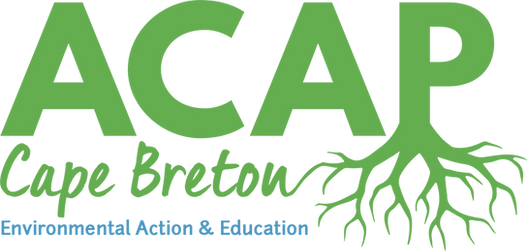
Featured Project
Growing Forward Together
Improving Drinking Water Quality at the MacAskill Brook Dam Reservoir
In November of 2024, CBU’s Plant Diversity and Intersectional Environmental Sciences classes joined the ACAP Cape Breton forest restoration team to complete tree planting for CBU’s ongoing initiative, Growing Forward Together. Situated on former farmland in Birch Grove, this site is located in the MacAskill Brook Dam Reservoir, a watershed within the CBRM that provides safe and clean drinking water for residents of Glace Bay, Dominion, Reserve Mines and surrounding communities.
Fifteen eager students gathered to plant a total of 300 saplings on this beautiful site. For some, it was their first time planting trees, while others had experience planting in entirely different climates and landscapes around the world. Together, they listened to the story told by the land. Once a mature and undisturbed forest, this land was cleared and maintained for agriculture. These students became a part of the story themselves, joining together to break ground and begin planting hardwood saplings.
In the story of natural succession, the first step in transitioning back to a forest ecosystem from pastoral land is with a layer of spruce. Spruce is well adapted to disturbed soil and open exposure to wind and sunlight. The next step in succession is diversification: the shelter and soil conditions created by the spruce and other natural processes of early succession make way for hardwoods and other species to grow. The team helped to nurture this process with the introduction of four species of deciduous trees, including red maple, sugar maple, red oak and yellow birch.
Research led by former CBU professor, Dr. Thomas Bouman, and Anthony Mazzocca of the CBRM Water Utility indicates the importance of deciduous trees in filtering rainwater. As a result of this research, plans to reforest drinking watersheds are well underway in the CBRM. Watersheds with intact natural filtration systems such as large deciduous forests or robust freshwater mussel communities are more cost-effective to treat because nature has begun the treatment process already.
Through the Growing Forward Together project, in celebration of CBU’s 50th Anniversary, more than 11,000 hardwood seedlings have been planted at this site alone. Imagining 50 years into the future, we can envision this old farmland transformed into a young, diverse forest, providing habitat and water filtration benefits for many years to come.
Soil Restoration: Colliery Lands Park
The soil restoration at Colliery Lands Park is a part of the larger Growing Forward Together Project, launched in partnership with Cape Breton University. This initiative aims to plant 50,000 trees across Cape Breton Island, with species and plants carefully selected to be adaptable to future environmental changes.
The Growing Forward Together project is a signature initiative commemorating CBU’s 50th anniversary year, which aims to plant 50,000 trees across Cape Breton Island.
“The restoration approaches we are employing as part of the Growing Forward Together project will support forest succession and promote biodiversity.
Through a Two-Eyed Seeing approach, both Elders and scientists tell us to consider what each tree needs. It is not simply above-ground conditions we need to think about when we plant trees: soil is the cradle substrate that will nurture the growth of these plants and support a healthier, more resilient ecosystem.”
Kathleen Aikens, Executive Director
The soil restoration process at Colliery Lands Park focuses on reintroducing natural microbial relationships to support tree growth in the disturbed soil. We selected early succession tree species that are already inclined to recolonize post-industrial sites, mixed with longer living species that would be expected to grow in this area.
The team gathered soil from the forest surrounding Waterford Lake. The soil is mixed with compost and worm castings, then brewed into a microbial tea to water the newly planted trees. Given the depleted soil, extra nutrients such as spent brewery grains (provided by Breton Brewing) are added to provide additional organic matter to help these microbes establish.
Colliery Lands Park is the site of the former Number 12 and Number 16 Colliery Mines, making this a particularly unique Growing Forward planting site. The soil is a mix of potash, brick fragments, and other introduced fill - far removed from the natural soil that would have been found here prior to the mine’s opening in 1901.
Colliery Lands Park Soil Restoration Video



